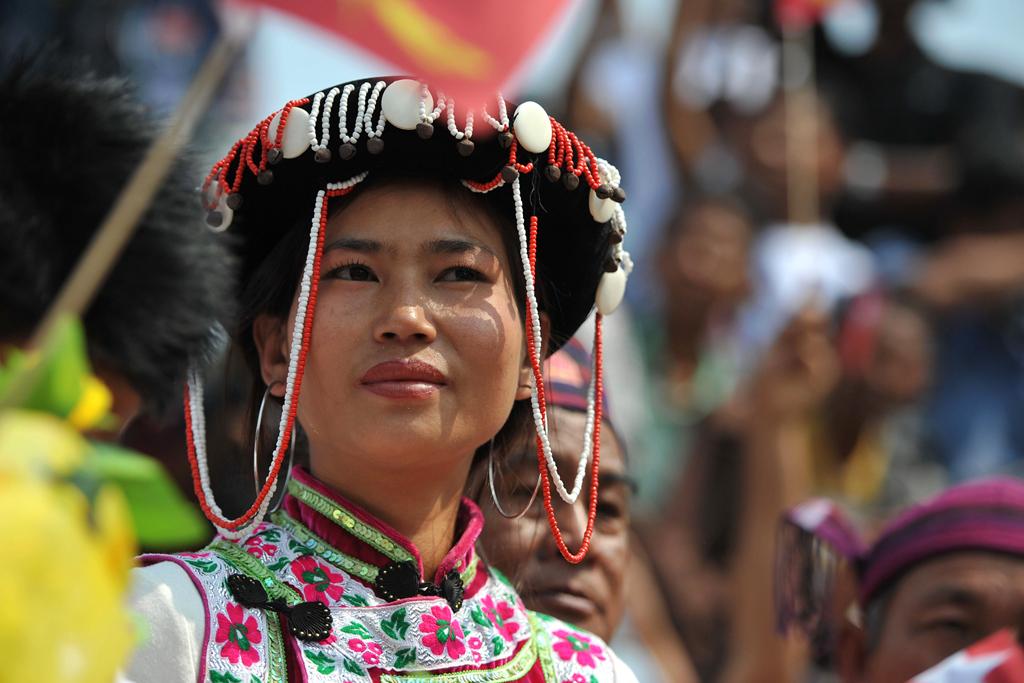After 65 years of ethnic violence, calls for federalism in Burma grow louder
A Kachin tribe woman listens to a speech by pro-democracy leader Aung San Suu Kyi during her visit to the town of Moe Kaung on February 23, 2012. The Kachin rebels were scheduled to hold peace talks with the Burmese government on March 8, 2012.
YANGON, Myanmar — Ja Nan Lahtaw, assistant director of the Nyein Foundation, an NGO actively involved in peace-building processes with ethnic groups in Myanmar said Wednesday she had “cautious optimism” about the prospects of the country’s ongoing peace talks.
“I think the president and his negotiation team really want to bring about peace…they have good intentions,” Ja Nan Lahtaw told a group of journalists, referring to President Thein Sein. “But the process is the problem.”
Armed conflict between ethnic minority groups and the government has been a nearly constant presence in Myanmar since the country’s independence from Britain in 1948. Under Thein Sein, the Burmese government has pursed a ‘Three-Phase Peace Plan” — bilateral negotiations with ethnic groups whose goals include ceasefire agreements, development tasks and the eventual formation of political parties and representation in parliament. To date, the government has signed 13 ceasefire agreements according to the Myanmar Peace Monitor website, and only in recent weeks has violence come to a standstill.
Reflecting for a moment on the immense number of lives lost after 65 years of armed ethnic conflict, estimated by veteran journalist Bertil Lintner to be in the hundreds of thousands, Ja Nan Lahtaw inhaled deeply, and, through her thick black glasses, turned her eyes upward and extolled a heavy sigh.
Ja Nan Lahtaw cited increased transparency, inclusion of a wide range of stakeholders and a supportive international community as contributing to the success of the peace talks. But she warned that “any ceasefire that doesn’t lead to political dialogue will not solve the problem” and would likely result in many more years of violence.
Speaking at the World Economic Forum in the capital of Naypyidaw earlier this month, opposition leader and potential presidential candidate Aung San Suu Kyi said, “I do not want to aggravate the situation by saying that one community is wrong or the other community is wrong. If they have not enjoyed the sympathy of politicians or influential groups then it makes them more extremist.”
When asked about Aung San Suu Kyi’s approach to ethnic conflicts since becoming a political leader, Ja Nan Lahtaw responded that “to be honest, I’m not 100 percent disappointed, but I have some disappointment…she is being pragmatic.”
As Burma has moved from a military to civilian government over the past two years, a newfound openness is affecting country. Not only have journalists and businessmen flocked to the country in recent months to take note of these changes, but so have academics hoping to ameliorate one of the world’s longest-running sectarian conflicts.
Unpalatable to the previous regime, many voices have arisen recently lobbying for ethnic federalism in Burma.
Aye Aye Win, an AP senior correspondent based in Burma, said that reporting that used the word “federalism” was previously impermissible. However, in present-day Burma, federalism is publicly discussed even by government ministers.
Over the last 30 years, federalism along ethnic lines has been implemented in East and West Africa, along with Eastern Europe with mixed results. At times governments structured around ethnic federations have allowed for greater cultural autonomy and peaceful coexistence, but the political concept is not a governmental panacea. Ethnic federations with impractically strong central governments can still selectively delegate economic opportunity to theoretically autonomous states, while assenting to nominal cultural expression.
However, because the armed ethnic groups in Burma have the “overwhelming” support of their civilian compatriots, according to Ja Nan Lahtaw, and many of Burma’s ethnic border regions are resource-rich, a consensus appears to be building for the creation of ethnic federal states with legitimate governmental authority and economic capital to jointly participate in the future of Burma.
Every day, reporters and producers at The World are hard at work bringing you human-centered news from across the globe. But we can’t do it without you. We need your support to ensure we can continue this work for another year.
Make a gift today, and you’ll help us unlock a matching gift of $67,000!
